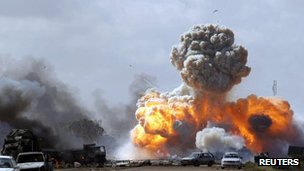14 May 2012 - {{hitsCtrl.values.hits}}
 A leading human rights organisation has urged Nato to investigate fully the deaths of civilians in air strikes in Libya last year.
A leading human rights organisation has urged Nato to investigate fully the deaths of civilians in air strikes in Libya last year.
18 Nov 2024 6 hours ago
18 Nov 2024 7 hours ago
18 Nov 2024 7 hours ago
18 Nov 2024 8 hours ago
18 Nov 2024 18 Nov 2024